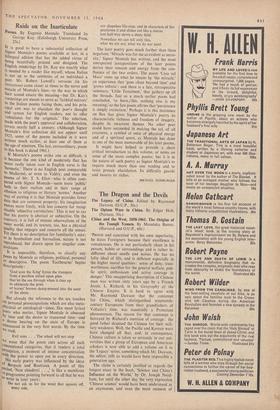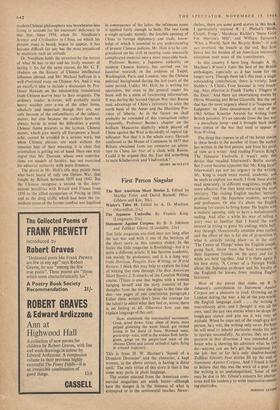The Dragon and the Devils
The Opium Wars in China. By Edgar Holt. (Putnam, 30s.)
China and the West, 1858-1861. The Origins of the Tsungli Yamen. By Masataka Banno. (Harvard and O.U.P., 60s.) 'PROUD and conceited with his own superiority, he hates Foreigners because their excellence is conspicuous. He is not particularly clean in his person, habits or surroundings and is rather in- different about smells and noises. He has no lofty ideal of life, and is deficient especially in the higher moral qualities : sense of duty, trust- worthiness, sacrifice for the general welfare, pub- lic spirit, enthusiasm and active courage in danger.' This unappetising description of Chinese man was written sixty years ago by a French Jesuit, L. Richard, in his Geography of the Chinese Empire. It is hard to agree with Mr. Raymond Dawson that the contempt for China, which distinguished nineteenth- century Europeans from their grandfathers of Voltaire's time, was essentially a Protestant phenomenon. The reason for that contempt is betrayed .by Richard's mention of courage : the good father despised the Chinese for their mili- tary weakness. Well, the Pacific and Korean wars have changed all that, and, in consequence, Chinese culture is taken so seriously in our uni- versities that a group of European and American scholars is now able to add a volume on it to the 'Legacy' series; something which Mr. Dawson, the editor, tells us would have been impossible a generation ago.
The claim is certainly justified as regards the longest essay in the book, 'Science and China's Influence on the World,' by Dr. Joseph Need- ham, for until the other day the very expression 'Chinese science' would have been understood as ' an oxymoron, and even the most eminent of modern Chinese philosophers was browbeaten into trying to account for his ancestors' deficiency in that line. Since 1954, when Dr. Needham's Science and Civilisation in China, on which his present essay is based, began to appear, it has become difficult for any but the most prejudiced to maintain such an attitude.
Dr. Needham holds the attention by the nature of what he has to say and his lively manner of saying it. So, for the same reason, do Mr. G. F. Hudson on the history of Chinese intellectual influence abroad, and Mr. Michael Sullivan in a well-illustrated essay on Chinese Art. And it was an exceri;.7t idea to include a discussion by Pro- fessor Hawief: on the relationship translations from Chinese poetry bear to their originals. The ordinary reader, hy.vever, will probably make heavy weather over r,me of the other items, scholarly and important though they are, not only because of the unfamiliarity of the subject- matter, but also because the authors have not always borne in mind the difficulties a purely Chinese theme presents to the layman. Chinese names, which give nearly all Europeans a head- ache, cannot be avoided in a serious work, but when Chinese phrases are used without the remotest hint of their meaning, it is clear that orientalism is getting out of hand. Here one may regret that Mr. Dawson, whose own contribu- tions are models of lucidity, has not exercised his editorial authority with more firmness.
The plural in Mr. Holt's title may puzzle those who have heard of only one Opium War, that fought by Britain between 1839 and 1842. But the Chinese recognise a second in the inter- mittent hostilities with Britain and France from 1856 to the allied occupation of Peking in 1860, and as the drug traffic which had been the im- mediate cause of the former conflict was legalised
in consequence of the latter, the infamous name is applied fairly enough to both. The two form a single episode, namely, the forcible opening of China to foreign diplomacy and trade, know- ledge of which is essential to any understanding of present Chinese policies. Mr. Holt is to be con- gratulated on his skill in turning some unusually complicated material into a most enjoyable book.
Professor Banno, a Japanese authority on modern Chinese history, has carried out ex- haustive research, in the archives of Taipei, Washington, Paris and London, into the Chinese political background during the last years of the same period. Unlike Mr. Holt, he is writing for specialists, but even to the general reader his book will be a mine of fascinating information. It was during the Second Opium War that Russia took advantage of China's extremity to seize the north bank of the Amur and the Maritime Pro- vince of Siberia. As in the future we shall probably be reminded of this transaction rather frequently, Professor Banno's chapter on the brilliant Muscovite duplicity which played off China against the West is decidedly of topical sig- nificance. Not that it is the whole story. Disraeli confessed to the House of Commons in 1857 that Britain abstained from too extensive an adven- ture in China for fear of a clash with Russia. Could it be argued that the Tsar did something to earn Khabarovsk and Vladivostok?
HENRY MCALEAVY











































 Previous page
Previous page